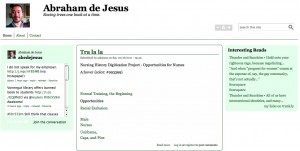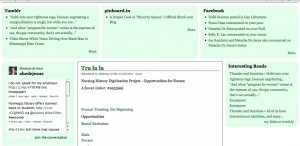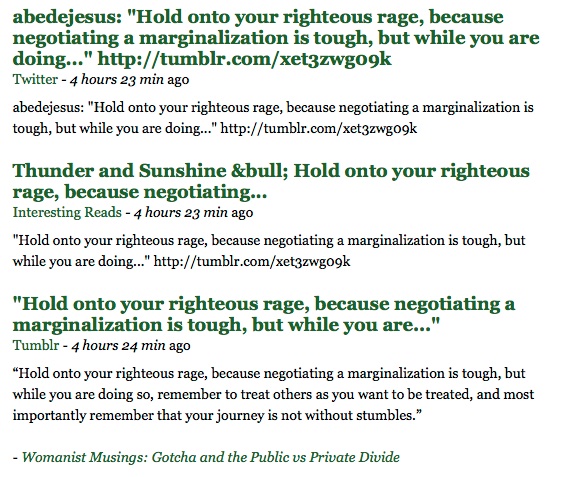I recently posted my evaluation of the class. I was struck how one of the early themes in the class came and bit me in the ass: on the separation of the personal and professional. Something like a school class seems to straddle that divide since classrooms are not as formal as the workplace but not as casual as a pub. This particular class was somewhat of an experiment for me: could I successfully leave behind my old conceptions of professionalism and actually engage in a class for the first time in six or seven years?
Certainly it started out that way. I was so engaged and immersed in the class that I was chastised for ‘babbling’ by our instructor: it was likely meant to be lighthearted but it still stung. This was quickly followed by the debates surrounding the professional and personal in the field (or any field, I suppose). In this debate, I continuously did my best to point out how even having this distinction apply to you is a privilege. There are many folks in the world who simply don’t have that luxury. In other words, the only way for a person like me to be ‘professional’ is to entirely erase large portions of my personality. Ultimately, I ceded the field and allowed myself to be silenced. It is possible no one noticed, but I certainly noted a distinct downgrade in my participation, engagement, and immersion in the class. I quickly became concerned only with fulfilling the requirements and getting my three credits, just like every other class I’ve had in the past five years.
I bring all this up in context of the evaluation because I didn’t write many of my comments because they would have clearly identified me: I’m back to being a professional. Even now, I’m not really leveling any actual criticisms and I won’t. This class has certainly re-affirmed that I must allow myself to continue to be erased if I wish to succeed in my chosen field.
On other matters, I noticed another theme in the class: a distinct pessimism about the field as a whole. A lot of negative feelings about the direction and future of the information profession. This pessimism is not unique to this class, it appears endemic amongst professionals today. In some ways, I see this as a direct consequence and fault of the usual way history and narratives are taught in this culture. That Marxist notion of revolutions and constant breaks from tradition to carve new paths in history. I don’t buy this narrative and my optimism about the profession remains unchanged.
Instead, I’ve also been arguing for a perspective of continuity to a few different people and on a few different topics. I think it is important to always locate current trends and notions in the larger context of history and human nature. There are no radical breaks or revolutions: simply transitions from one state to another, each determined by what came before. There is also far, far more stability in humans than many people in this class seem to think.
In terms of the profession, all I can see are the exciting opportunities. I can also see how there is room for everyone in a field as diverse as information. There are those in the class who want to be children’s librarians. I’ll agree that the outlook can be disheartening. However, people are still having babies. They still like having these babies read to. They still need these babies to grow, learn, and be educated. How can there ever be an end to children’s librarians? Maybe you’ll be reading from an iPad with data projector. Or whatever. But the basics remain the same. The only thing that could bring this niche to an end is if there are no more babies. Focusing on continuity and what is stable is how I maintain my biyuti. Simply a suggestion.
I live my life with the belief that there is room enough for all of us. For me to be a ‘professional’ as myself, instead of being Abraham cast in the role of Librarian. I would like my performance to actually be one that represents me. I dream of this day. There is also room for those who do not wish to constantly be learning new social media tools and only want to deal with rare books. The world is vast and we can make space for everyone.
And, thus, I bid farewell to Libr559M. I learned a great deal (many of the lessons weren’t on the syllabus and not all were positive — but I *learned*). To those I argued with, I want to you to know that I hold no grudges. While I took much of what occurred very personally, I remain focused on the bigger picture. I leave this class not with resentment or ill-will, but with greater resolve to create a world where all people are free.
Peace.


